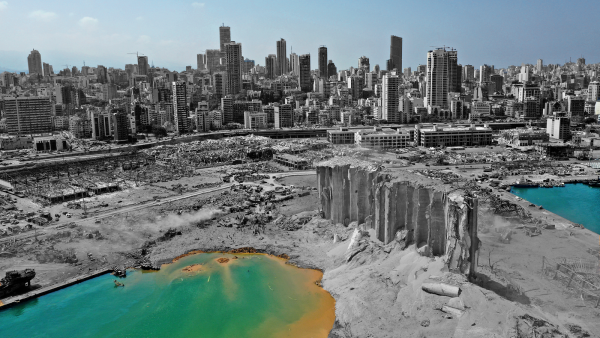Only when everyone thought the Lebanese economy can't get any worse, the struggling Mediterranean country, known for its touristic sites and cheerful population, had to deal with a global pandemic that wrecked even the world's strongest economies, a collapse in the currency and most recently, a historical near-apocalyptic explosion that destroyed huge parts of the capital city. But how will the Lebanese economy stand in the face of these back-to-back crises?
Apocalyptic scenes saw a thick red-orange mushroom cloud envelop streets surrounding the port, where buildings burned and emergency crews frantically searched the rubble for survivors.https://t.co/ggSArh6zQj
— Al Bawaba News (@AlBawabaEnglish) August 5, 2020
The explosion of 2750 tons of ammonium nitrate wreaked havoc for several kilometers in the center of Beirut, destroying a yet-to-be-counted number of buildings with residential apartments and offices, killing at least 135 people, injuring thousands and displacing about 300k people.
The tragic scale of the damage caused by the blast has ruined about 75% of the country's main port, destroying tons of wheat and crucial ships of drugs used to treat chronic illnesses. It has also released an unknown amount of toxic gases that can be dangerous, which is why residents of the city have been advised to either "seek refuge in nearby cities or wear multiple face masks at a time."
According to Beirut's governor Marwan Abboud, an initial assessment of the destruction resulting from the port's explosion "can be estimated between $10-$15 billion, and possibly more."
#Beirut’s governor says there are between 250,000 and 300,000 people who are now without homes, estimates cost of damage caused by massive explosion to more than $3 billion.#BeirutExplosion #beirut_بيروت #Liban #BeirutBlast #Liban #Lebanon https://t.co/jgiaA2YtJ5
— Middle East Online (@meonewsen) August 5, 2020
These dreadful figures can be read in an even darker light knowing the already crashing economy in the country. With the third-highest debt-to-gross-domestic product worldwide where unemployment has hit 25% and hundreds of thousands of youth immigrating every decade, Lebanon is about to record it's worst yet financial collapse.
Despite a relatively growing economy in the years that followed the 15-year-long civil war (1975-1990), deepening political tensions among warlords, who continued to rule the country based on a sectarian political regime, were constantly highlighted in attempts to understand the worsening plunge that started in the mid-2000s.
'I can see the despair on their faces': Lebanon's economy unravels https://t.co/iRQSIEH475
— Guardian Australia (@GuardianAus) July 30, 2020
According to BBC, a third of 7 million Lebanese people are living below the poverty line, negatively affecting decisions of investments as long as the purchasing power.
The economic depression has also been evident in the government's inability to provide many basic services, including power, drinking water, clear air, affordable healthcare services, or public transportation.
Due to the fact that only 13% of the country's land is arable, Lebanon imports 80% of its food needs, at an annual cost of $500 million.
In 2015, Lebanon experienced what has been termed as the "trash crisis," when political rivals failed to make an agreement over new garbage collection contracts. Lebanese streets were filled with garbage for months, causing long-term damage to the environment, which was later linked to an increase of diagnosed cancer cases.
In 2019, and thanks to the central bank's policy of borrowing from commercial banks at higher interest rates than those of the market resulted in a "freefall" for the Lebanese lira in the black market, forcing it to lose 40% of its official value.
This change of the lira's value was reflected in a spike of prices that affected all imported products, including food. In a report published by the Telegraph by the end of June 2020, where they cited UN figures pointing at a 56% rise in food prices between October 2019 and April 2020 in addition to a 50% rise between mid-March and May, as the country felt the severe impact of closures imposed in the wake of COVID-19.
News of wheat reserves near the Beruit port being damaged in this week's tragedy is generating even more fears of an approaching famine, one that can only be avoided if the international community launches a relief campaign to support the devastated country.
In the last few days, several regional and international countries have pledged different kinds of medical and financial support to Lebanon, including Jordan, Saudi Arabia, the United Arab Emirates, Kuwait, Iraq, Qatar, France, the UK, the US, Russia, Iran, and many other countries.
The economic devastation in Lebanon has never been so worrying, but hopes are focused on national reforms and international solidarity to help the country with great potential regain its glory, especially if it stops being a hot spot for international conflicts.







